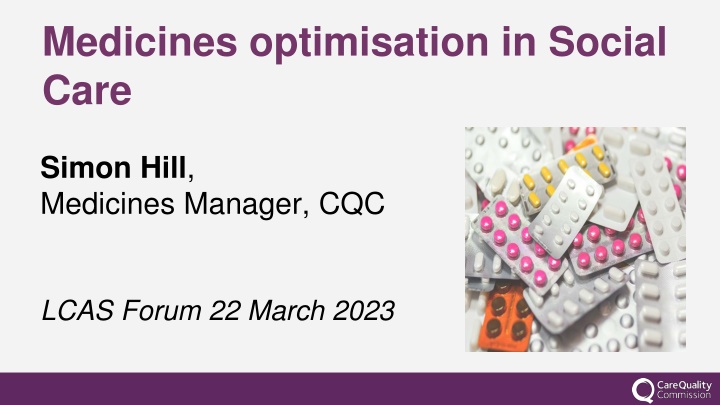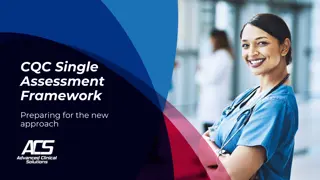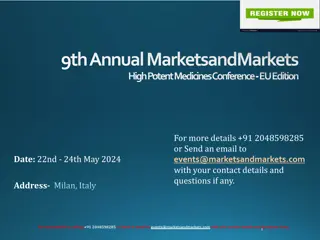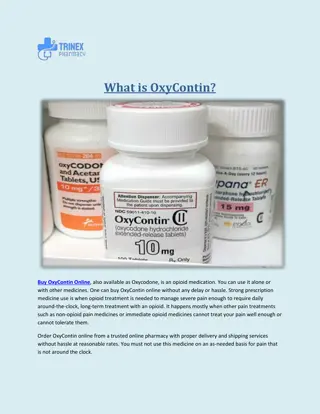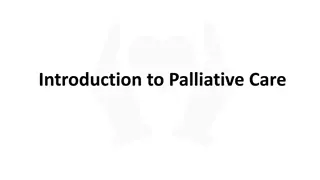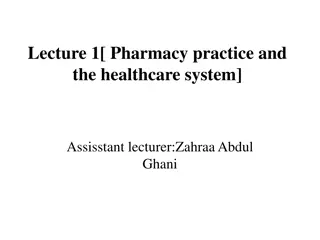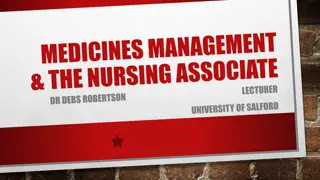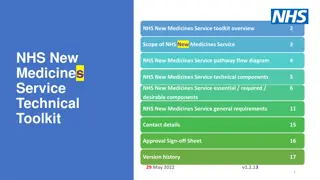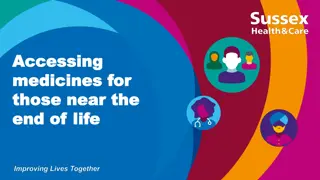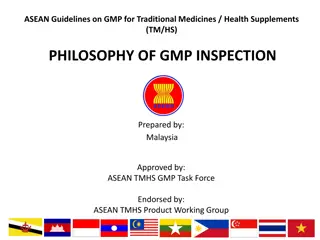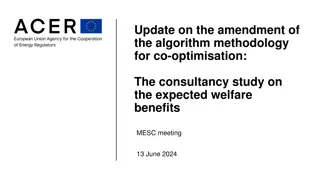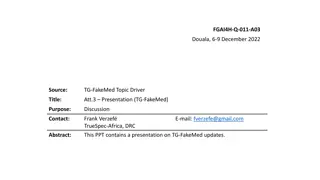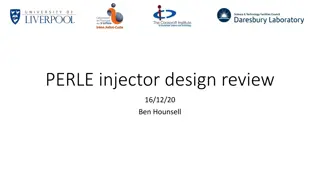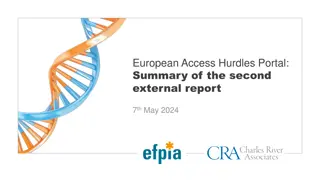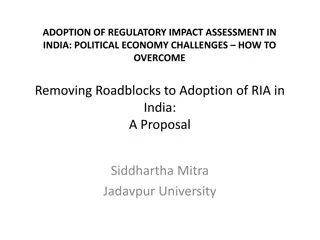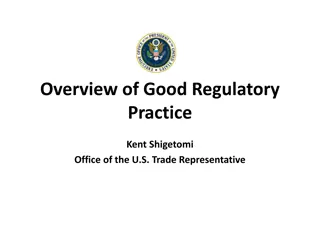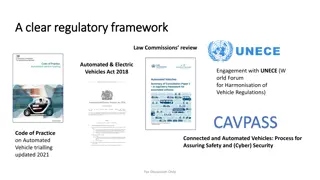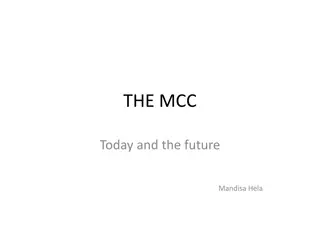Medicines Optimisation in Social Care: New Regulatory Model and Assessment Framework
Implementing a new strategy over the next five years to adapt to changes in health and care, a new regulatory model focuses on developing offline judgements and ongoing monitoring in social care. The single assessment framework assesses providers, local authorities, and integrated care systems based on key themes and quality indicators. Inspection processes ensure safe medicines optimisation by involving individuals in planning changes and meeting their needs.
Download Presentation

Please find below an Image/Link to download the presentation.
The content on the website is provided AS IS for your information and personal use only. It may not be sold, licensed, or shared on other websites without obtaining consent from the author.If you encounter any issues during the download, it is possible that the publisher has removed the file from their server.
You are allowed to download the files provided on this website for personal or commercial use, subject to the condition that they are used lawfully. All files are the property of their respective owners.
The content on the website is provided AS IS for your information and personal use only. It may not be sold, licensed, or shared on other websites without obtaining consent from the author.
E N D
Presentation Transcript
Medicines optimisation in Social Care Simon Hill, Medicines Manager, CQC LCAS Forum 22 March 2023
Our new strategy: key themes We ll implement our new strategy over the next five years so we can be flexible and adapt to changes in health and care.
A New Regulatory Model Model: Now Develop judgements (offline) Ongoing monitoring but inspections schedule based on previous rating Publish narrative inspection report Inspection: gather evidence using KLOEs (Single point in time) Assessment frameworks (multiple) Line-up judgements against ratings characteristics Process Not just inspection - variety of options (multiple points in time) more time spent in higher risk services Model: Future Ratings updated, short statement published Single assessment framework Ongoing assessment of quality and risk Team rating based on evidence found
A single assessment framework Our framework will assess providers, local authorities and integrated care systems with a consistent set of key themes, from registration through to ongoing assessment Aligned with I statements, based on what people expect and need, to bring these questions to life and as a basis for gathering structured feedback Expressed as We statements; the standards against which we hold providers, LAs and ICSs to account People s experience , feedback from staff and leaders , feedback from partners, observation, processes, outcomes Data and information specific to the scope of assessment, delivery model or population group
How will we inspect medicines? Key question: Safe I feel safe and am supported to understand and manage any risks Quality statement: Medicines optimisation We make sure that medicines and treatments are safe and meet people s needs, capacities and preferences by enabling them to be involved in planning , including when changes happen. Evidence categories: talking to people and staff, observations of medicines administration, review of medicines records Specific evidence and quality indicators: refer to best practice guidance NICE SC1 and NG67
Health and Social Care Act 2008 (Regulated Activities) Regulations 2014 Regulations 12 (1) Care and treatment must be provided in a safe way for service users 12 (2) without limiting paragraph (1) the things which a registered person must do to comply with that paragraph include: 12(2) (g) the proper and safe use of medicines 9: Person-centred care 10: Dignity and respect 11: Need for consent 13: Safeguarding service users from abuse and improper treatment 14: Meeting nutritional and hydration needs 17: Good governance 18: Staffing
Medicines errors Medicines errors can include prescribing, dispensing, administration and monitoring errors. Causing 712 deaths, and contributing to 1,708 deaths 237 million medicines errors occur in the NHS in England every year 68.3 million errors (28% of total) cause moderate or serious harm But what about social care services? ? EEPRU report - PREVALENCE AND ECONOMIC BURDEN OF MEDICATION ERRORS IN THE NHS IN ENGLAND November 2017*
PIR & Notifications The provider information return asks: How many medicines errors have you had in the past 12 months? Around 44% of responses said zero Currently, CQC need to be notified of a medicines error if the cause or effect of a medicine error met the criteria to notify us of one of the following: A death An injury Abuse, or an allegation of abuse An incident reported to or investigated by the police 8
Medicines in health and adult social care 3 October 2024
eMAR Is the system appropriate to the service and does it meet national guidelines for record keeping? How will you manage the transition from paper records to digital? Is there continuing access to IT and pharmaceutical support to make sure systems are updated and support is in place for systems failure? Has the medicines policy updated to reflect the electronic system? Do systems allow access to the system for appropriate people? What arrangements are in place if the system or internet goes down? How is training delivered and how is staff competency to use the system assessed? 10
eMAR How are periods managed where regular staff are not available, and they have to use temporary staff who may be unfamiliar or untrained with the operating system? How will purchased medicines and homely remedies be managed? How will staff be trained on how to audit the system and is this carried out regularly? How are mid-month changes and hospital discharges managed and added to the system safely? Does the system have safety alerts to prevent medicines being given too close together or at the wrong time? Does the system meet current data governance and cyber security requirements? For example, compliance with the Data Security and Protection Toolkit (DSPT). 11
eMAR Other records to consider: There should be systems in place to make sure the following records are accessible and managed safely. Paper records or other digital records used alongside eMAR records including: Controlled drugs records Fluid and thickening fluid charts Insulin charts Patch application records 12
eMAR Other records to consider: When required or PRN guidance Topical medicines administration records (TMAR) and guidance Warfarin anticoagulant Record Covert administration guidance Enteral feeding and medicines administration guidance Records of medicines administered by external healthcare professionals 13
Compliance aids/dosette boxes Compliance aids are one of several interventions to support safe administration Original packs is preferred option Promote independence and reablement Medicines review and person centred support Use an assessment tool to determine need 14
Medicines audits Expectations for staff clearly set out within the medicines policy Opportunity for shared learning Regular review of systems with records made of any actions required, and a system to ensure that actions are followed up and completed. A focus on outcomes for people (e.g. gather people s views, find out how they are getting on with their medicines and if they are happy with them with them etc.) A mechanism for sharing outcomes to promote improvement for people Using best practice guidance including tools from NICE, skills for care 15
CQC medicines resources Medicines information for adult social care services - Care Quality Commission (cqc.org.uk)
